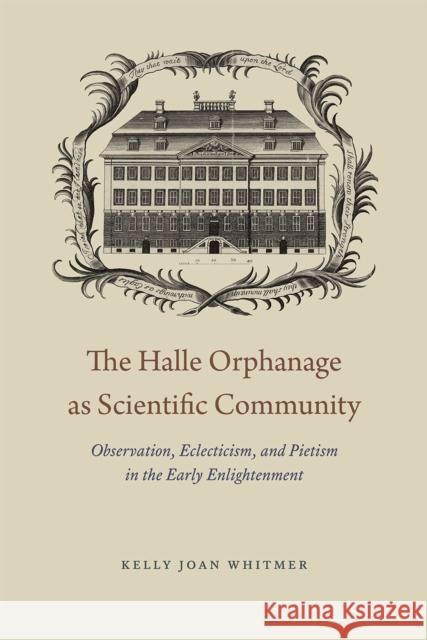The Halle Orphanage as Scientific Community: Observation, Eclecticism, and Pietism in the Early Enlightenment » książka
The Halle Orphanage as Scientific Community: Observation, Eclecticism, and Pietism in the Early Enlightenment
ISBN-13: 9780226243771 / Angielski / Twarda / 2015 / 200 str.
The Halle Orphanage as Scientific Community: Observation, Eclecticism, and Pietism in the Early Enlightenment
ISBN-13: 9780226243771 / Angielski / Twarda / 2015 / 200 str.
(netto: 171,85 VAT: 5%)
Najniższa cena z 30 dni: 178,24
ok. 30 dni roboczych.
Darmowa dostawa!
Founded around 1700 by a group of German Lutherans known as Pietists, the Halle Orphanage became the institutional headquarters of a universal seminar that still stands largely intact today. It was the base of an educational, charitable, and scientific community and consisted of an elite school for the sons of noblemen; schools for the sons of artisans, soldiers, and preachers; a hospital; an apothecary; a bookshop; a botanical garden; and a cabinet of curiosity containing architectural models, naturalia, and scientific instruments. Yet, its reputation as a Pietist enclave inhabited largely by young people has prevented the organization from being taken seriously as a kind of scientific academy--even though, Kelly Joan Whitmer shows, this is precisely what it was.
The Halle Orphanage as Scientific Community calls into question a long-standing tendency to view German Pietists as anti-science and anti-Enlightenment, arguing that these tendencies have drawn attention away from what was actually going on inside the orphanage. Whitmer shows how the orphanage's identity as a scientific community hinged on its promotion of philosophical eclecticism as a tool for assimilating perspectives and observations and working to perfect one's abilities to observe methodically. Because of the link between eclecticism and observation, Whitmer reveals, those teaching and training in Halle's Orphanage contributed to the transformation of scientific observation and its related activities in this period.










